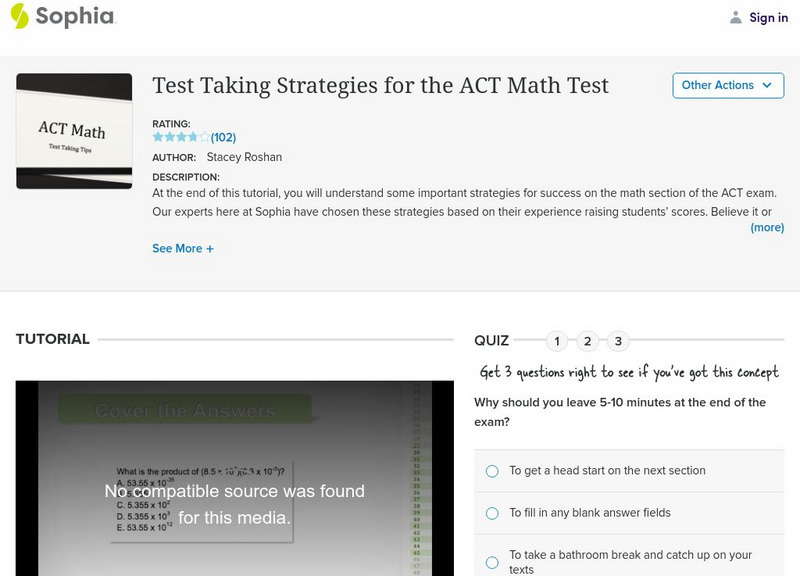Hi, what do you want to do?
Bozeman Science
Mendelian Genetics
Young scientists explore Gregor Mendel's work on pea plants, his laws of segregation and independent assortment. They work through genetic problems and then finish by looking at Huntington's disease and genetic testing.
Bozeman Science
Hardy-Weinberg Punnett Square
Scholars learn how to use a Punnett square analyzing red hair and then apply this process to an entire gene pool over time. The instructor walks viewers through a few problems, determining percentages found within a gene pool.
Bozeman Science
Genetics
An informative video begins with 14 vocabulary words related to genetics, allowing scholars to think about their definitions before the instructor reviews a few tricky definitions. Individuals then learn about Gregor Mendel's...
Bozeman Science
DNA Replication
Young biologists explore the theories of DNA replication, learning about the Meselson-Stahl experiment and how it proved DNA replication through semiconservative replication. The video reviews the parts of DNA and then delves...
Bozeman Science
Comparing DNA Sequences
Through the mapping of the DNA of songbirds, scientists have discovered a gene network common among the species. In the video, scholars explore the comparison of DNA sequences, then attempt to place DNA sequences on a cladogram. They see...
Bozeman Science
Chromosomal Inheritance
Scholars see, through a monohybrid cross, how alleles are distributed during meiosis. The video instructor then explores Thomas Hunt Morgan's research on fruit flies, determining that genes are located on chromosomes and showing that...
Bozeman Science
Advanced Genetics
The strengths and problems associated with Mendelian genetics are explored in a video that first reviews Mendelian genetics and independent assortment. Viewers then explore problems with Mendelian genetics such as linked genes,...
Bozeman Science
The Sordaria Cross
Scholars briefly review meiosis and then apply these steps, through visuals, to Sordaria, a fungus that can be grown in class to support meiosis. The lesson emphasizes the importance of crossing over in meiosis and shows how to...
Bozeman Science
Signal Transduction Pathways
Signal transduction pathways are like the strings of Jimi Hendrix guitar being plucked and amplified! The video begins with an animation of a specific signal transduction pathway, detailing how epinephrine affects liver cells to release...
Bozeman Science
Phases of Mitosis
You slough off all your skin cells once every seven years. Thank goodness for mitosis, or we would all be looking pretty strange without skin. The video begins by reviewing the cell cycle, looks at an overview of cells undergoing...
Bozeman Science
Mitosis
Although we cannot clone ourselves yet, our bodies make copies of our cells every day. The video begins by defining diploid and haploid. Learners see the cell cycle and begin to understand what happens in interphase before mitosis...
Crash Course
Real Gases
The Ideal Gas Law isn't always ideal. Learn about situations where gases behave differently and calculate those changes by using van der Waals' equation.
Crash Course
Ideal Gas Problems
The Hindenburg and its use of the highly flammable gas hydrogen, used to keep it afloat, eventually caught fire and killed 36 people. Use the Ideal Gas Law through analysis of the Hindenburg and discover why scientists chose...
Crash Course
Redox Reactions
The breakdown of your breakfast and plants photosynthesizing all relate to the simple movement of electrons. Learn about the complex manner of redox reactions, where electrons move from one compound to another, changing and propelling...
Crash Course
Partial Pressures & Vapor Pressure: Crash Course
How much pressure is exerted by the mixture of gases in a scuba tank? Introduce pupils to Dalton's Law of Partial Pressure and vapor pressure in the video sure to interest the class. The video also reminds viewers that gases are not...
Crash Course
The Ideal Gas Law
Can you crush a soda can using only the air around you? Use an engaging video to teach about the relationship between pressure, volume, moles, and temperature of a given gas, all done with the Ideal Gas Law.
TED-Ed
How to Detect a Supernova
While a star explodes every second or so in the observable universe, we can't observe a supernova in its first moments. Discover the fascinating science behind how astronomers and physicists are attempting to detect supernovas early...
University of Florida
Understanding Car Crashes: It's Basic Physics!
Make an impact on young physicists with this fun collection of resources. After first watching a video and taking notes on the physics of car crashes, students go on to complete a series of activities that explore the...
Lifehacker
Programming! Learn the Basics of Coding, How to Pick a Language a Project, and More!
Kick off an introductory computer science course with this exploration of computer programming basics. From variable types and writing statements in JavaScript to finding a web host and deploying a website, this resource provides...
Khan Academy
Khan Academy: Lab Values and Concentrations: Units for Common Medical Lab Values
Figure out how to interpret the units in common medical labs including the CBC, Chem 10, and LFTs. [11:24]
Annenberg Foundation
Annenberg Learner: Thinking and Communicating Like a Biologist
The goal of this seven-day unit is to look at the big ideas in science literacy. This video on how to think and communicate like a biologist is the first lesson in the unit. [7:23]
Goodwill
Gcf Global: Synthesizing Information
In this how-to video, students will learn how to synthesize multiple pieces of informational text. Synthesizing content from multiple sources will help students provide evidence in their informational writing....
Sophia Learning
Sophia: Test Taking Strategies for the Act Math Test
At the end of this tutorial, you will understand some important strategies for success on the math section of the ACT exam.
Sophia Learning
Sophia: Chunking (Paragraph by Paragraph)
This lesson explains the reading strategy of chunking paragraphs.




























